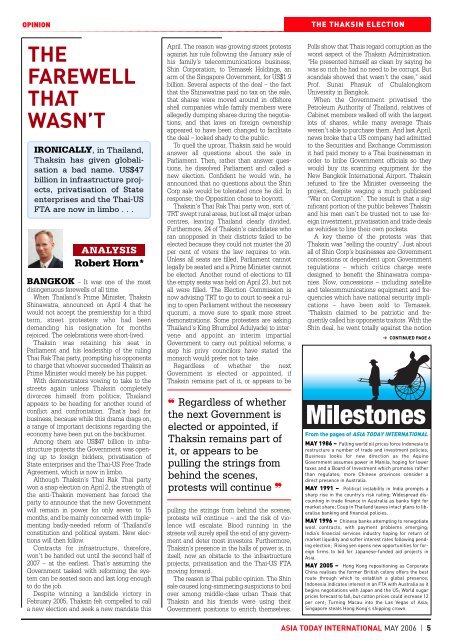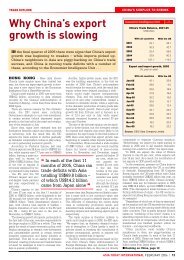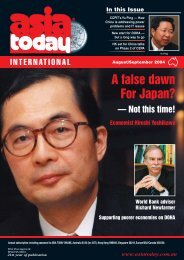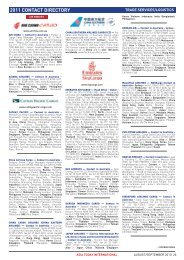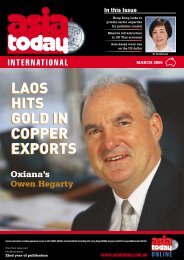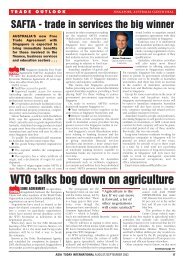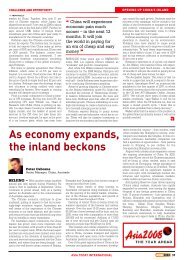d - Asia Today International
d - Asia Today International
d - Asia Today International
You also want an ePaper? Increase the reach of your titles
YUMPU automatically turns print PDFs into web optimized ePapers that Google loves.
OPINION<br />
THE<br />
FAREWELL<br />
THAT<br />
WASN’T<br />
IRONICALLY, in Thailand,<br />
Thaksin has given globalisation<br />
a bad name. US$47<br />
billion in infrastructure projects,<br />
privatisation of State<br />
enterprises and the Thai-US<br />
FTA are now in limbo . . .<br />
ANALYSIS<br />
Robert Horn*<br />
BANGKOK – It was one of the most<br />
disingenuous farewells of all time.<br />
When Thailand’s Prime Minister, Thaksin<br />
Shinawatra, announced on April 4 that he<br />
would not accept the premiership for a third<br />
term, street protesters who had been<br />
demanding his resignation for months<br />
rejoiced. The celebrations were short-lived.<br />
Thaksin was retaining his seat in<br />
Parliament and his leadership of the ruling<br />
Thai Rak Thai party, prompting his opponents<br />
to charge that whoever succeeded Thaksin as<br />
Prime Minister would merely be his puppet.<br />
With demonstrators vowing to take to the<br />
streets again unless Thaksin completely<br />
divorces himself from politics, Thailand<br />
appears to be heading for another round of<br />
conflict and confrontation. That’s bad for<br />
business, because while this drama drags on,<br />
a range of important decisions regarding the<br />
economy have been put on the backburner.<br />
Among them are US$47 billion in infrastructure<br />
projects the Government was opening<br />
up to foreign bidders, privatisation of<br />
State enterprises and the Thai-US Free Trade<br />
Agreement, which is now in limbo.<br />
Although Thaksin’s Thai Rak Thai party<br />
won a snap election on April 2, the strength of<br />
the anti-Thaksin movement has forced the<br />
party to announce that the new Government<br />
will remain in power for only seven to 15<br />
months, and be mainly concerned with implementing<br />
badly-needed reform of Thailand’s<br />
constitution and political system. New elections<br />
will then follow.<br />
Contracts for infrastructure, therefore,<br />
won’t be handed out until the second half of<br />
2007 – at the earliest. That’s assuming the<br />
Government tasked with reforming the system<br />
can be seated soon and last long enough<br />
to do the job.<br />
Despite winning a landslide victory in<br />
February 2005, Thaksin felt compelled to call<br />
a new election and seek a new mandate this<br />
April. The reason was growing street protests<br />
against his rule following the January sale of<br />
his family’s telecommunications business,<br />
Shin Corporation, to Temasek Holdings, an<br />
arm of the Singapore Government, for US$1.9<br />
billion. Several aspects of the deal – the fact<br />
that the Shinawatras paid no tax on the sale,<br />
that shares were moved around in offshore<br />
shell companies while family members were<br />
allegedly dumping shares during the negotiations,<br />
and that laws on foreign ownership<br />
appeared to have been changed to facilitate<br />
the deal – looked shady to the public.<br />
To quell the uproar, Thaksin said he would<br />
answer all questions about the sale in<br />
Parliament. Then, rather than answer questions,<br />
he dissolved Parliament and called a<br />
new election. Confident he would win, he<br />
announced that no questions about the Shin<br />
Corp sale would be tolerated once he did. In<br />
response, the Opposition chose to boycott.<br />
Thaksin's Thai Rak Thai party won, sort of.<br />
TRT swept rural areas, but lost all major urban<br />
centres, leaving Thailand clearly divided.<br />
Furthermore, 24 of Thaksin's candidates who<br />
ran unopposed in their districts failed to be<br />
elected because they could not muster the 20<br />
per cent of voters the law requires to win.<br />
Unless all seats are filled, Parliament cannot<br />
legally be seated and a Prime Minister cannot<br />
be elected. Another round of elections to fill<br />
the empty seats was held on April 23, but not<br />
all were filled. The Election Commission is<br />
now advising TRT to go to court to seek a ruling<br />
to open Parliament without the necessary<br />
quorum, a move sure to spark more street<br />
demonstrations. Some protesters are asking<br />
Thailand's King Bhumibol Adulyadej to intervene<br />
and appoint an interim impartial<br />
Government to carry out political reforms, a<br />
step his privy councilors have stated the<br />
monarch would prefer not to take.<br />
Regardless of whether the next<br />
Government is elected or appointed, if<br />
Thaksin remains part of it, or appears to be<br />
❝ Regardless of whether<br />
the next Government is<br />
elected or appointed, if<br />
Thaksin remains part of<br />
it, or appears to be<br />
pulling the strings from<br />
behind the scenes,<br />
protests will continue ❞<br />
pulling the strings from behind the scenes,<br />
protests will continue – and the risk of violence<br />
will escalate. Blood running in the<br />
streets will surely spell the end of any government<br />
and deter most investors. Furthermore,<br />
Thaksin’s presence in the halls of power is, in<br />
itself, now an obstacle to the infrastructure<br />
projects, privatisation and the Thai-US FTA<br />
moving forward.<br />
The reason is Thai public opinion. The Shin<br />
sale caused long-simmering suspicions to boil<br />
over among middle-class urban Thais that<br />
Thaksin and his friends were using their<br />
Government positions to enrich themselves.<br />
THE THAKSIN ELECTION<br />
Polls show that Thais regard corruption as the<br />
worst aspect of the Thaksin Administration.<br />
“He presented himself as clean by saying he<br />
was so rich he had no need to be corrupt. But<br />
scandals showed that wasn’t the case,’’ said<br />
Prof. Sunai Phasuk of Chulalongkorn<br />
University in Bangkok.<br />
When the Government privatised the<br />
Petroleum Authority of Thailand, relatives of<br />
Cabinet members walked off with the largest<br />
lots of shares, while many average Thais<br />
weren’t able to purchase them. And last April,<br />
news broke that a US company had admitted<br />
to the Securities and Exchange Commission<br />
it had paid money to a Thai businessman in<br />
order to bribe Government officials so they<br />
would buy its scanning equipment for the<br />
New Bangkok <strong>International</strong> Airport. Thaksin<br />
refused to fire the Minister overseeing the<br />
project, despite waging a much publicised<br />
“War on Corruption”. The result is that a significant<br />
portion of the public believes Thaksin<br />
and his men can’t be trusted not to use foreign<br />
investment, privatisation and trade deals<br />
as vehicles to line their own pockets.<br />
A key theme of the protests was that<br />
Thaksin was “selling the country”. Just about<br />
all of Shin Corp’s businesses are Government<br />
concessions or dependent upon Government<br />
regulations – which critics charge were<br />
designed to benefit the Shinawatra companies.<br />
Now, concessions – including satellite<br />
and telecommunications equipment and frequencies<br />
which have national security implications<br />
– have been sold to Temasek.<br />
“Thaksin claimed to be patriotic and frequently<br />
called his opponents traitors. With the<br />
Shin deal, he went totally against the notion<br />
➔ CONTINUED PAGE 6<br />
From the pages of ASIA TODAY INTERNATIONAL<br />
MAY 1986 – Falling world oil prices force Indonesia to<br />
restructure a number of trade and investment policies;<br />
Business looks for new direction as the Aquino<br />
Government assumes power in Manila, hoping for lower<br />
taxes and a Board of Investment which promotes rather<br />
than regulates; more Chinese provinces consider a<br />
direct presence in Australia.<br />
MAY 1991 – Political instability in India prompts a<br />
sharp rise in the country’s risk rating; Widespread discounting<br />
in trade finance in Australia as banks fight for<br />
market share; Coup in Thailand leaves intact plans to liberalise<br />
banking and financial policies.<br />
MAY 1996 – Chinese banks attempting to renegotiate<br />
wool contracts, with payment problems emerging;<br />
India’s financial services industry hoping for return of<br />
market liquidity and softer interest rates following pending<br />
election; Rising yen opens new opportunities for foreign<br />
firms to bid for Japanese-funded aid projects in<br />
<strong>Asia</strong>.<br />
MAY 2005 – Hong Kong repositioning as Corporate<br />
China realises the former British colony offers the best<br />
route through which to establish a global presence;<br />
Indonesia indicates interest in an FTA with Australia as it<br />
begins negotiations with Japan and the US; World sugar<br />
prices forecast to fall, but cotton prices could increase 12<br />
per cent; Turning Macau into the Las Vegas of <strong>Asia</strong>;<br />
Singapore steals Hong Kong’s shipping crown.<br />
ASIA TODAY INTERNATIONAL MAY 2006 | 5


